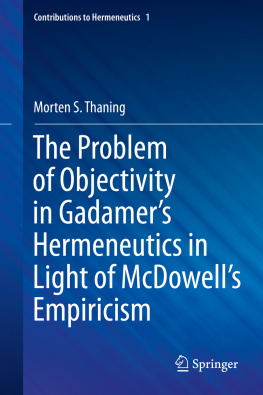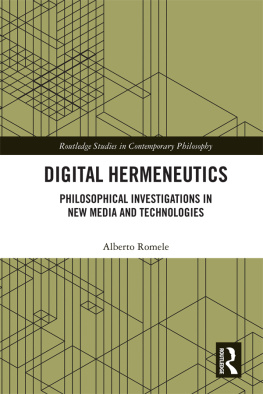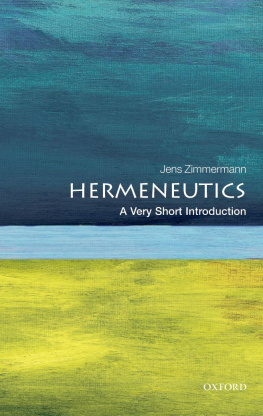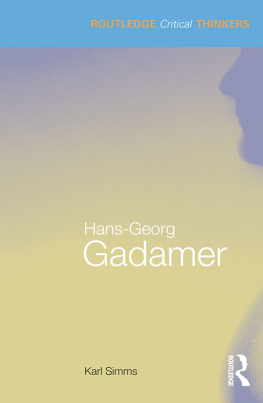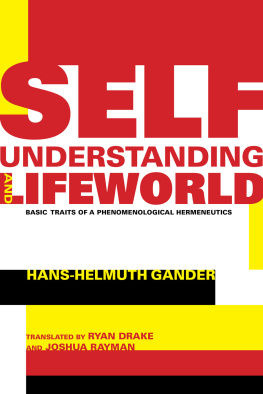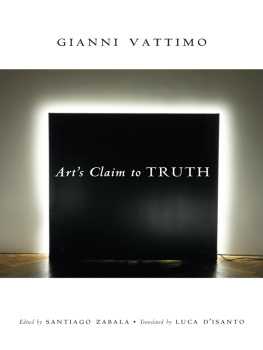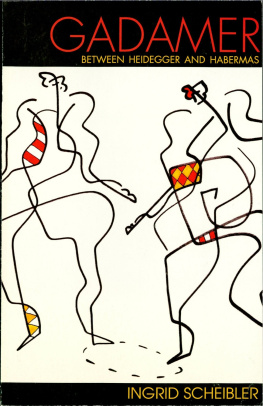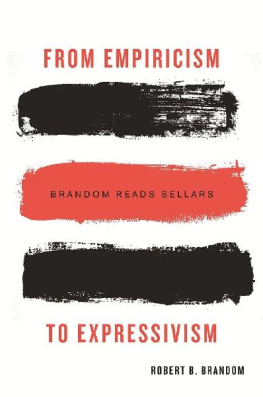1. Introduction: Reconstructing Philosophical Hermeneutics
Hans-Georg Gadamers philosophical hermeneutics is developed as a dialogical form of thought. He is a philosophical ventriloquist, one who articulates his thoughts through the prominent figures of the tradition rather than attempting to develop a system of his own. In the decades after the publication of Truth and Method, Gadamer also engaged in intense dialogue with prominent, contemporary philosophical figures in order to defend and develop his hermeneutics. The debates with Jrgen Habermas and Jacques Derrida are perhaps the most memorable examples of such encounters.
Theres no doubt that the dialogical form of Gadamers thought is in part an expression of his personal propensity. But it also connected with a guiding thought in philosophical hermeneutics, namely that understanding of a complex problem is best achieved by articulating it as a common subject matter through dialogue. The following investigation employs this approach in relation to Gadamers philosophical hermeneutics. It aims to develop and reassess his philosophy by bringing it into a dialogue with John McDowells minimal empiricism. In accordance with Gadamers own dialogue with the philosophical tradition, the intention is not to use McDowell in order to work out a historical reconstruction of philosophical hermeneutics. Rather, the goal is to present a hermeneutic conception of objectivity and experience in light of McDowells empiricism that avoids the potential problems to which Gadamers critics have pointed. As it will become clear, this reading of philosophical hermeneutics also reflects upon our understanding of McDowells thinking.
Gadamers philosophical hermeneutics belongs in the Continental tradition of phenomenology. He views himself as part of what he terms the phenomenological movement, originating in Edmund Husserls phenomenology. Within this tradition, Martin Heideggers hermeneutic phenomenology is undeniably the position that exercises the most important influence on his thinking. McDowells philosophy, on the other hand, is part of the analytic tradition shaped by such figures as Gottlob Frege, Ludwig Wittgenstein, Donald Davidson and Wilfred Sellars. Underlying these very different influences, we find a common interest in ancient philosophy. Both Gadamer and McDowell published some of their first work on Plato and, for both, an early engagement with Aristotles practical philosophy played a decisive role in shaping their thought. Moreover, McDowell shares Gadamers philosophical ventriloquism. They both articulate their thoughts through prominent figures of the tradition, and therefore understanding their original contribution requires study of many classical authors in order to critically evaluate how Gadamer and McDowell apply their thoughts in a modern context.
In McDowells Mind and World , we find a number of references to Gadamer that may initially seem scattered and of limited relevance to the general thrust of the book. By investigating this, it becomes possible to develop and strengthen both approaches, while at the same time, the double perspective makes it possible to articulate a clearer diagnosis of the potential problems in both Gadamers and McDowells positions.
More specifically, the aim is to show that McDowells empiricism can help articulate hermeneutic concepts of objectivity and experience. Conversely, the investigation demonstrates that a hermeneutic account of meaning can support and develop McDowells recent attempt to avoid an objectifying conception of the content of our experience.
The Problem of Objectivity in Philosophical Hermeneutics
The relevance of McDowells thinking for developing philosophical hermeneutics becomes clear if we take our point of departure both in Gadamers rejection of the idea of an ultimate foundation for our understanding, and in his alternative, the idea that our understanding is always historically situated. Even though this rejection is crucial to his project and has inspired philosophers in diverse traditions, it has also occluded the fact that what is at stake for philosophical hermeneutics in understanding and interpretation is the experience of truth. That is to say, even though Gadamer takes exception to the ambitions of traditional philosophy in a decisive way, he shares its conviction that any understanding that truly deserves its name is objective, in the minimal sense that it is constrained by its relation to its subject matter ( Sache ). Since the status of objectivity is never sufficiently clarified in Gadamers thinking, the strengths of his philosophical hermeneutics the rejection of the conviction that philosophys task is to provide an ultimate foundation for understanding; and the elevation of the historicity of understanding to a hermeneutic principle, I will examine Vattimos interpretation and describe how its untenable nature points to the need for an alternative account of objectivity in philosophical hermeneutics. The discussion of Vattimo also makes clear that such an account is bound to have transcendental implications. Vattimo rejects the idea that philosophical hermeneutics is a form of transcendental philosophy because he thinks this is equivalent to a problematic meta-theory of objectivity. He therefore ignores Gadamers repeated but also vague remarks concerning a transcendental dimension of hermeneutics. I think that Vattimo is right to warn against a transcendental hermeneutics in the sense of a meta-theory. But since his own account is indistinguishable from scepticism, he indirectly points towards a different conception of a transcendental hermeneutics, one developed from within the order of representation. In contrast to Vattimo, such an approach would give proper consideration to the first-person or experiential perspective. It is from this perspective that we should address the nature of objectivity by attempting to describe how our understanding or interpretation can be normatively guided by its subject matter. Vattimo is aware that if we want to do justice to our experience that our understanding is more or less adequate and in some cases, even fails completely this requires that we make sense of the idea of normative guidance. Nonetheless, his interpretation of hermeneutics as an enacted form of scepticism undermines this very idea.
In Chap. , McDowells interpretation of Sellars Kantian idea that our intentional life takes place within the so-called space of reasons is presented as a framework within which a hermeneutical concept of objectivity can be reconstructed. What makes McDowell of crucial and positive relevance to Gadamer is that he belongs to a tradition that insists that objectivity, understood in the broad sense as Sachlichkeit , must be at the very core of our conception of intentionality, and as such he conceives objectivity precisely in terms of a constraint by the subject matter upon our understanding. McDowell stresses the fundamental normative nature of objectivity, conceived as something that our understanding can succeed at or fail to live up to. Since he accounts for the way in which the subject matter of our judgements and interpretations provides normative constraint, he can provide Gadamers hermeneutics with an adequate notion of objectivity.
Crucial to McDowells Sellarsian conception is that we must be able to manifest the objectivity of our interpretations and judgements discursively. Only then are we able to critically evaluate whether we are in fact normatively guided by the nature of the subject matter or whether that merely seems to be the case. The idea of normative guidance by the subject matter thus hinges on the possibility of discursive manifestation. This is the motivation behind McDowells Sellarsian rejection of the so-called Myth of the Given the idea that we, in our intentional life, could be constrained by non-conceptual content, i.e. a subject matter that, from the subjects point of view, is completely beyond the scope of verbal articulation. Even if this rejection could initially seem foreign to Gadamers project in Truth and Method , a number of his writings, especially on Plato and Aristotle, reveal that his thinking is congenial with the fundamental assumptions of McDowell and the Sellarsian tradition. Of particular importance in this respect is Gadamers emphasis on the demand of the Platonic Socrates to give an account ( logon didonai ). McDowell points to this ancient paradigm when he speaks of the time-honoured tradition in Western philosophy of conceiving of reason and discourse as intrinsically connected.

